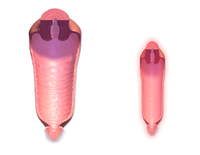
Photo from wikipedia
Microbial changes in vaginal ecosystem may accelerate the process of cervical carcinogenesis. The developed cervical cancer can lead to changes in the vaginal microbiota. The aim of our study is… Click to show full abstract
Microbial changes in vaginal ecosystem may accelerate the process of cervical carcinogenesis. The developed cervical cancer can lead to changes in the vaginal microbiota. The aim of our study is to determine the vaginal microbiota changes at women with FIGO I stage cervical cancer. We conducted an open, single-site survey in the Department of Gynecology of the Military Medical Academy in Sofia, Bulgaria, from 2014 to 2019 year. The study included a total of 32 women aged 38–55 years with clinical and pathology established cervical cancer (FIGO I stage). The underlying vaginal DNA microbiological test indicated presence or absence of bacterial vaginosis, other vaginal infections or normal vaginal microbiota. Of 32 (100%) women enrolled in our study, 19 (59.4%) was with FIGO IA stage cervical cancer and 13 (40.6%) with IB stage. Disturbances of vaginal microbiota in we found at 23 (71.9%) of women with cervical cancer included in our study. At the rest of 9 (28.1%) women we found out normal vaginal microbiota. Bacterial vaginosis was determined clinically and microbiologically in 15 (46.9%) women enrolled in the study. Aerobic vaginitis caused by Streptococcus species we establish at 4 (12.5%) of women. Trichomonas vaginalis infection have 1 (3.1%) women and Candida Albicans the last one 1 (3.1%) from this group with disturbed vaginal microbial balance. Bacterial dysbacteriosis, characterized by a predominance of Gardnerella vaginalis alone or in complex with other anaerobic bacteria, aerobic vaginitis and other sexually transmitted vaginal pathogens from one side and a concomitant paucity of vaginal Lactobacillus species may be an HPV-dependent cofactor for cervical neoplasia development. Only with this single observation it is difficult to confirm that vaginal microbiota dysbiosis contributes to HPV infection and carcinogenesis.
Journal Title: Archives of Microbiology
Year Published: 2019
Link to full text (if available)
Share on Social Media: Sign Up to like & get
recommendations!